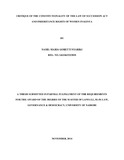| dc.contributor.author | Nyariki, Maria G | |
| dc.date.accessioned | 2015-01-09T07:24:44Z | |
| dc.date.available | 2015-01-09T07:24:44Z | |
| dc.date.issued | 2014 | |
| dc.identifier.uri | http://hdl.handle.net/11295/79395 | |
| dc.description.abstract | I thank the Lord Almighty for the energy, health and enthusiasm to pursue the LLM degree
despite the busy schedule in my life.
I am greatly indebted to my supervisor Honourable Justice William Musyoka for his dedication,
guidance, patience, invaluable contribution, effort and encouragement when reviewing and
discussing the work and ensuring that the thesis was well done in spite of his busy schedule.
Once again I thank him for his valuable time and thoughts in supervising this work and ensuring
the correct spellings, grammar and sentencing.
I am greatly indebted to my parents Prof. Marcel Ohanga Odhiambo and Mrs. Anastasia Cecelia
Magoma Odhiambo and to my aunt Helen Kwamboka Ombati for being my inspiration.
I thank everyone who contributed directly and indirectly to the success of this thesis. To my
classmates and colleagues at work, thank you for the support during the one academic year at the
School of Law, University of Nairobi | en_US |
| dc.description.abstract | The Constitution of Kenya, 2010 has brought in a paradigm shift in the treatment of every person in Kenya. Through its equality provision, the Constitution, 2010 abhors discrimination against either gender by providing an equal platform to the issues of property ownership and inheritance. In fact, Article 27(3) reinforces this point by providing that women and men have the right to equal treatment, including the right to equal opportunities in political, economic, cultural and social spheres. Property inheritance, which was the subject of this study was hitherto controlled and managed to the benefit of the male gender through archaic legislations. The Law of Succession Act, the Islamic Sharia Law and the Customary Laws were couched in patrimonial terms thus making it difficult for the female gender to inherit property in Kenya. This thesis thus proceeds on the basis that the role of courts under the new constitutional dispensation is crucial in giving effect to the equality clause under the constitution, 2010. Courts through interpretative role can either declare a given act or provision of the law unconstitutional or read in a right into the discriminatory laws through its new mandate of developing the law to conform to the dictates of Constitutionalism. Accordingly and in conclusion, the thesis urges the society as a whole through its stratified segments to be vigilant and vibrant in ensuring that constitutional means such as litigation are encouraged to ensure that past discrimination against women in property ownership and inheritance are totally eliminated. | |
| dc.language.iso | en | en_US |
| dc.title | Critique of the Constitutionality of the Law of Succession Act and Inheritance Rights of Women in Kenya | en_US |
| dc.type | Thesis | en_US |
| dc.type.material | en_US | en_US |

